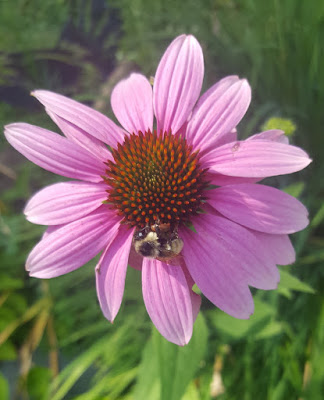 |
| I made another sign |
For thirteen years, an injustice has bothered me.
As injustices go, this one is small and very personal -- it happened to someone I love, and I have an overdeveloped sense of fairness. But it also was an injustice I could do something about.
Dwayne and I are both survivors of divorce, but he lost far more than I did when his long marriage ended in 2002 (at the same time mine ended). The canoe in these photos was his but she sold it. That's the simplest way to tell the story. And it's a typical divorce story. There are no unique divorces, just He said-she said, who did what when, I want-you want, Let's just get this over with.
After we married, Dwayne told me about the cedar strip canoe he bought from a maker in Ontario (see? all good things come to him from Ontario!) when he was forty, and how he'd added his nickname to the thwart in front of his seat in the stern. It was perhaps a harder loss to bear than anything else he lost.
 |
| He's nicknamed "Flint" for his hard head, but he has a soft heart. |
I knew where the canoe was -- tormentingly close, in a garage just up the road -- and I knew who owned it -- a really nice guy. It bothered me that Dwayne lost his cherished canoe. It bothered me that he didn't fight for it, that he just gave in and said, "Fine, take it."
Because she only wanted it to sell it.
Yet even as I fretted about the injustice of it, I never felt the urge to spend the money to buy it back. It didn't feel like my job to correct the decision he made in another lifetime.
Then in June, on a boat run upriver, as we passed by this guy's house and I thought about what was in his garage, the voice inside me, that voice that speaks clearly and it always, unfailingly right, said, "Get it back".
I've learned not to ignore that voice. In 1996, when the voice said, "Break up with him," but I ignored it, I ended up in my own unhappy marriage, so that's how I learned to trust the voice.
I thought at first the canoe would make a perfect birthday gift but realized I couldn't wait until the end of August -- one just doesn't know what could happen, right? So I decided to give it as an anniversary-and-birthday gift.
I made the deal to buy the canoe on July 13th, and Dwayne's father died the next day. So for two weeks, I knew that as he struggled with the loss of his father, he was going to gain a piece of his life back.
The voice is always, unfailingly, and sometimes freakishly, right.
I love all the serendipity in our life together. We ebb and flow, we give "for better or worse" a proper workout, but this time, Dwayne married a fighter. He married someone who doesn't give up, who won't give in, who forgets nothing and remembers every detail, every date, every word.
Who trusts in the voice that guides her life.
The voice that brought her back to the East Coast when her marriage ended.
The voice that brought a beloved canoe back into Dwayne's life just when he needed it.
That voice brought brought the canoe back into our marriage right when we need it. It's been ten years - ten! - since we canoed. Life just got complicated; for awhile, we were physically unable to lift a canoe or paddle, then eventually we stopped making time. I got Dwayne a fishing boat for his 60th birthday and that's what we use on the river.
But this canoe is who he is, and canoeing is who we are together, how we started out as a couple. And I couldn't have planned the day better for taking the "new" canoe out on the river and getting reconnected; the day was hot and the river was calm. Without saying a word, we renewed our vows: to keep paddling together, honouring the gentle strength up front and the power steering in back, taking up the slack with the other needs to rest, always moving forward yet going with the flow, knowing that even as the tide goes out, it will always come in again.
As Henry David Thoreau said, "Everyone must believe in something. I believe I'll go canoeing."

















